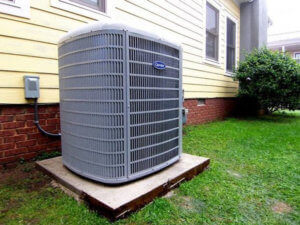
While air conditioners are designed to recirculate refrigerant, you may have had an HVAC tech tell you from time to time that your air conditioner needs refrigerant topped off. If you have ever heard this and wondered, “Why does my air conditioner need refrigerant?”, here is what you should know. Refrigerant is the fluid inside your air conditioner that easily changes between liquid and gaseous states. It moves through the condenser as a liquid and enters the evaporator coil, pulling heat and converting to a gas. In doing so, the refrigerant absorbs heat from your home and releases it outside, keeping you comfortably cool indoors.
Note that your AC’s refrigerant can never run out. This is because it exists within a closed, sealed system and keeps recirculating within it. So, when things are working as they should be, there is no question of topping up refrigerant. The exception is when there is a leak in the system that lowers refrigerant levels. Here is a look at why refrigerant can escape and what you can do about it.
If you need urgent service or air conditioner repair in St. Louis or the surrounding areas, our heating and air conditioning technicians are a call away.
Reasons for Your Air Conditioner Needing Refrigerant
The ban on the use of Freon (R-22) in the manufacture of air conditioners has been in effect since 2010. Its successor Puron (R-410A) is non-toxic but mildly harmful for the environment. Ideally, you do not want any refrigerant leak to contaminate your indoor air or affect the planet, as such any leaks or repairs should be dealt with quickly and professionally. But how do you know if you have a refrigerant leak in your AC?
The following are some common signs that your AC refrigerant levels are dropping:
- Warm air from vents
- Bubbling or hissing sounds from outdoor AC unit
- Ice on refrigerant lines
- Higher energy bills
These signs can also be traced to other problems such as a dirty air filter, closed vents, or an aging system. Our experienced HVAC professionals will be able to pinpoint the reasons why your AC needs refrigerant and bring up other issues found during inspection.
Here are some common reasons why you may experience refrigerant leaks in your AC:
- The components through which the refrigerant travels have suffered wear and tear, letting refrigerant escape out. They include the compressor, evaporator coils, rubber seals on service valve through which the refrigerant is filled, and coils and tubes through which the refrigerant passes.
- The AC’s copper tubing has corroded. This is often due to naturally forming formic acid that eats away at the tubing. As you may imagine, older ACs are most susceptible to rusting and weakening.
Once the problem has been discovered, our technicians evacuate the remaining refrigerant, carry out the necessary repair or replacement, and refill your system to the optimal level of refrigerant. This is specialized work requiring the use of appropriate tools of the trade and safety gloves to prevent contact with the refrigerant. If your air conditioner needs refrigerant, leave the job to the professionals.

A word of caution: If your air conditioner needs refrigerant, simply recharging your AC will not solve the problem. Always insist on knowing the root cause of the leak and have it fixed before the refill. Or else the refrigerant will just leak out again!
Keep Your AC Working Optimally and Prevent Refrigerant Leaks
An air conditioner needs refrigerant only if there are problems with the unit and not otherwise. If you believe that your AC needs refrigerant, get in touch with our St. Louis heating and air conditioning professionals for honest advice and flawless AC repair in St. Louis, Missouri. Call us at 314-993-1110 or get a quote online. We look forward to hearing from you.









